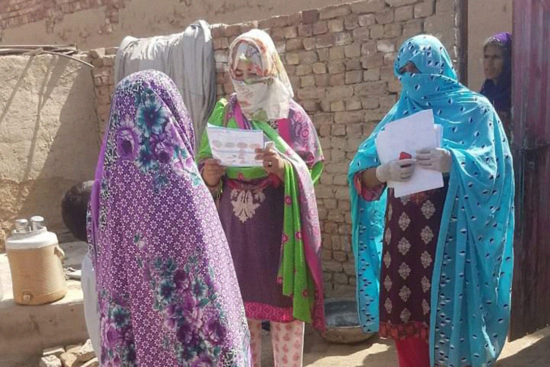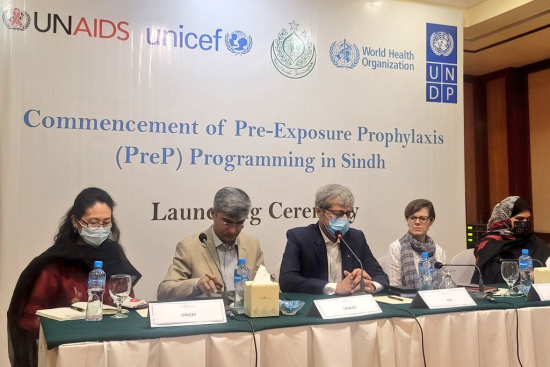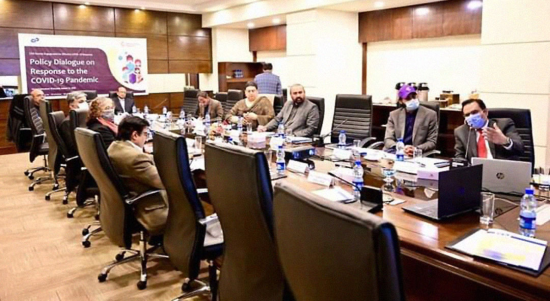Lessons learned from COVID-19 help Pakistan in the fight against HIV/AIDS
The actions taken in response to COVID-19 are helping the 165,000 people nationwide living with HIV.
4 July 2022 by Saadeqa Khan

Female healthcare workers advising a mother on HIV testing in rural Sindh, Pakistan. Photo credit Saadeqa Khan.
In 2019, 40-year-old Mohammad Aslam from Ratto Dero, a small town in Pakistan’s Sindh province, lost his two young daughters to HIV/AIDS.
“Due to the social taboos surrounding HIV/AIDS in Pakistan, parents were reluctant to get their kids tested,” says Faheem Solangi, a resident of Ratto Dero. “The situation blew up into a massive catastrophe.”
Since 2019, more than 50 children have died in the town due to HIV. A research report published in October 2019 revealed that 1,200 cases of HIV, including 900 children under 12, were linked to a paediatrician who reused unsterilised syringes and IV drips.
The total population of Ratto Dero is 225,000. Most low-income families visited the paediatrician as he was the cheapest doctor in the town.
“Due to the social taboos surrounding HIV/AIDS in Pakistan, parents were reluctant to get their kids tested,” says Faheem Solangi, a resident of Ratto Dero. “The situation blew up into a massive catastrophe.”
The paediatrician was arrested and healthcare authorities closed all clinics in the town that were using unsterile syringes, however hundreds of children must now live with the disease.
Pakistan’s battle against HIV
Dr Syed Hunain Riaz, a former facilitator at the Punjab AIDS Control Programme (PACP), says, “Pakistan has been beset with blood-borne diseases like AIDS, hepatitis B and hepatitis C since 1980, resulting in greater scrutiny of the reuse of syringes as well as blood transfusion and blood products.”
The National and Provincial AIDS control programmes took measures to ensure proper screening of blood products so that patients of diseases like haemophilia and thalassaemia who need regular transfusions are protected from blood-borne diseases.
Raiz adds, “During my tenure at PACP, we initiated several programmes to support patients living with HIV. A significant initiative was the training of hospital staff to break the stigma and taboos surrounding the disease. Most of the staff were reluctant to deal with HIV patients. We also regularly supplied antiretroviral drugs to the patients. Sadly, I believe this was cut during the COVID-19 pandemic.”
According to the Pakistan National AIDS Control Programme (NACP), nearly 165,000 people nationwide are living with HIV and yet, due to stigma, among other factors, only 36,902 patients are registered with the NACP and only 20,994 are getting antiretroviral therapy.
Aisha Isani, former programme manager of NACP, says, "There was an acute shortage of viral load testing kits for HIV during the first three months of the pandemic due to a halt in international AIDS agencies’ shipments. NACP did manage to supply medicines to some patients via courier services, even during the nationwide lockdown."
"COVID-19 created several challenges to Pakistan’s efforts to restrict viral diseases like polio, hepatitis, HIV, and others. However, we have learned lessons."
Lessons learnt from COVID-19
Despite these initial challenges, health workers across the country worked hard to get the HIV programme back on track. Mawara Irshad was a volunteer at Scientists against COVID-19 in Islamabad. “It was a transitory period for the hospital staff,” she says. “What we learned during these days helped us to combat other diseases like dengue, hepatitis, measles, polio and HIV. Plus, the local medical research culture in Pakistan has improved a lot, assisting in more stirring reforms in Pakistan’s healthcare system.”

Commencement of a game-changing programme against HIV in Ratto Dero, Pakistan.
Photo credit: Saadeqa Khan
Hameedullah, who formerly worked with Pakistan’s National Institute of Health, says: “The first lesson Pakistan learnt from COVID-19 was relying on evidence-based policies to save people’s lives. Meanwhile, provincial coordination enabled the government to implement effective healthcare policies based on updated localised data.
“Pakistan's government took rapid action to modify its strategy for controlling HIV. They are ensuring a regular supply of PPE for all field staff in rural areas and multi-month dispensing of antiretroviral treatment. Overall, there’s greater investment in the public healthcare sector.”
In the wake of the pandemic, Sindh’s government established Pakistan’s largest HIV testing and treatment centre in Ratto Dero in 2021. This centre provides life-saving antiretroviral drugs to patients in the whole area.
Ratto Dero resident Ali Ghumman says, “Most parents don't have sufficient money to get their kids treated in public hospitals in big cities of the province. Our kids are suffering and, while some of us receive financial assistance under the government’s Sehet Sahulat [health facilitation] programme, there are further treatment costs that affected families must cover themselves. And, although the programme helps alleviate financial burdens for parents, it needs infrastructure improvement and should be accessible to every disadvantaged family.”
Revamping policies against HIV
Dr Fehmida Iqbal Khan serves as the USAID community support advisor to Pakistan. She says, “UNDP and USAID are coordinating and/or planning several projects to regulate healthcare facilities in Ratto Dero and Larkana district. This includes looking at blood banks and HIV testing and treatment facilities.”

Zubair Faisal Abbasi (right) addresses a meeting on policy dialogue in response to COVID19.
Photo credit: Saadeqa Khan
Zubair Faisal Abbasi, an independent public policy specialist, adds: “COVID-19 created several challenges to Pakistan’s efforts to restrict viral diseases like polio, hepatitis, HIV, and others. However, we have learned lessons. Under its SDG programme, Pakistan initiated healthcare service tasks that aim to include HIV patients as a part of the community with equal access to preliminary healthcare level interventions.”
Abbasi goes on to say, “Additionally, the provision of prophylactics and sterilised syringes, and a shift in focus to auto-destruct syringes should improve the situation. Plus, the supply chain bottlenecks during the COVID-19 vaccination rollout have taught us so much. Overall, I believe that, actions taken in response to COVID-19 will have far-reaching positive impacts on viral diseases and vaccination in Pakistan.”
Link to research report: https://www.bmj.com/content/367/bmj.l6284
###
CONTACT:
James Fulker
Senior Manager, Editorial Content
Tel: + 41 22 909 29 26
Mob: +41 79 429 55 05
Follow us: Facebook / Twitter / LinkedIn / Instagram / #VaccinesWork

Source: https://www.gavi.org/vaccineswork/lessons-learned-covid-19-help-pakistan-fight-against-hivaids
"Reproduced with permission - Gavi, The Vaccine Alliance"
Gavi, the Vaccine Alliance
For more HIV and AIDS News visit...
Positively Positive - Living with HIV/AIDS:
HIV/AIDS News
|